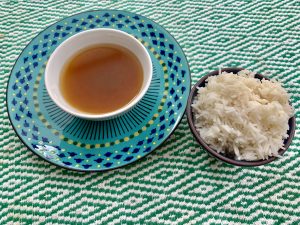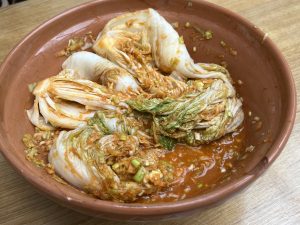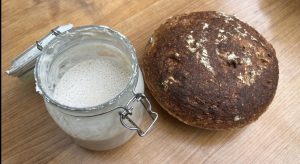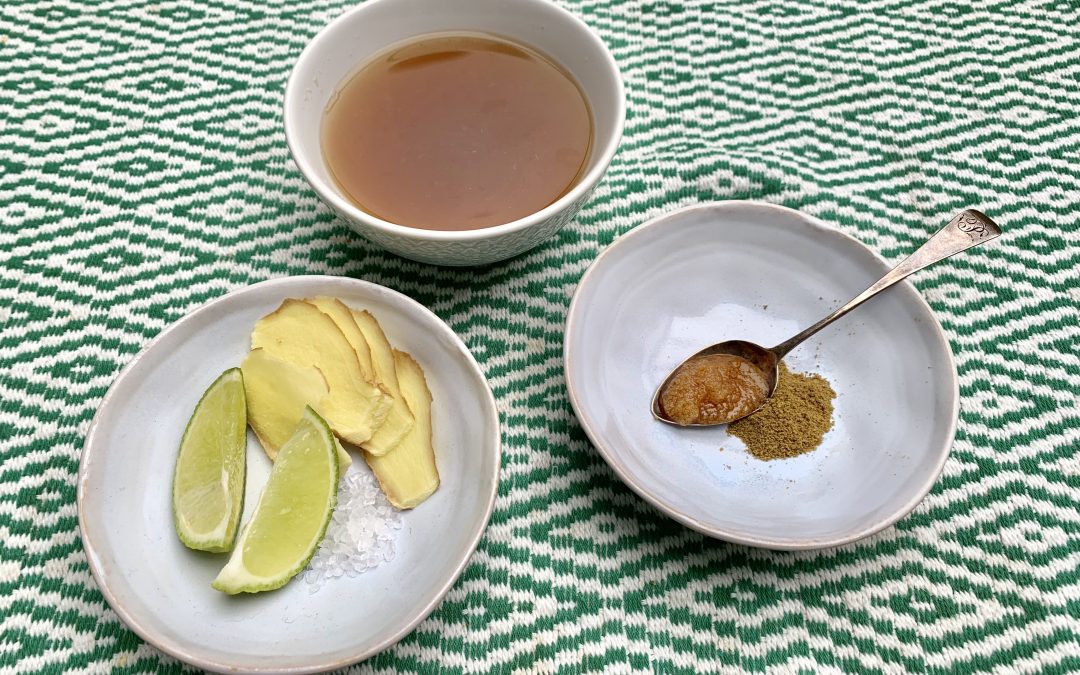At the core of Ayurvedic therapy is Agni Deepana and Ama Pachana – balancing the digestive fire and eliminating toxins from the body respectively.
Impaired digestive fire can affect the body’s ability to digest food. The digestive fire can become impaired when we eat incompatible foods i.e. we eat foods which can imbalance our Dosha (our physical and emotional constitution). Both these factors: imbalanced Dosha and impaired Agni creates Ama (toxins).
Ama can stay in the digestive system, or over time can overflow and migrate with the imbalanced Dosha to sites in the body where the Doshas dominates. E.g. for Vata people a prominent site is the colon. Vata people generally experience impaired digestive fire (vishamagni, which means variable) in the form of gas and bloating in the colon. Over time Ama can migrate to other sites in the body manifesting into a more deep set condition e.g to the bones in the form of arthritis.
Pitta people experience impaired digestive fire (tikshanagi, which means burning too fast) in the stomach and small intestine as heat or acid. Again, over time Ama can migrate to other sites of the body. For pitta people this may show in the skin, eyes or liver.
When people with prominent Kapha Dosha, over consume Kapha foods this can result in mandagni, slow digestive fire. The digestive system is sluggish resulting in heaviness in the body and weight gain.
Following the Ayurvedic principles of ‘like increases like and opposites create balance’ we can choose foods which most suit our constitutional type. We understand how the qualities (or gunas) and taste can balance or impair our digestive fire. Knowing this we can choose foods which suit us best. We can also use simple remedies using herbs, spices and ingredient you will probably have in your kitchen cupboard for Ama Pachana and Agni Deepana treatment.
For Vishamagni and Mandagni, we can use spices to warm and stimulate the digestive system. It would be like warming the oven before putting food into it.
Spices you could use would be: ginger, black pepper, long pepper, ajwan, honey, ghee, basil, bay leaf, clove, cayenne, cinnamon, black cumin, cumin, dill, fenugreek, horseradish, marjoram, asafoetida, nutmeg, oregano, paprika, turmeric
Here are some home remedies:
- 1 tsp Ajwan seeds roasted then boiled in water or roasted and ground and taken with honey or with a little bit of ginger.
- A small piece of fresh grated ginger, a squeeze of lime and a pinch rock salt 5 min before meals.
 Spicy soup – 1tsp coriander seeds, 1tsp cumin seeds, 1 tsp tamarind paste, 8-10 curry leaves, 2-3 garlic cloves, 6-8 slices fresh ginger, a little salt (grind into a paste, add 500mls cups of water and boil for 20 mins. You can have this on its own as a soup before your main meal or as a light meal with bread or rice.
Spicy soup – 1tsp coriander seeds, 1tsp cumin seeds, 1 tsp tamarind paste, 8-10 curry leaves, 2-3 garlic cloves, 6-8 slices fresh ginger, a little salt (grind into a paste, add 500mls cups of water and boil for 20 mins. You can have this on its own as a soup before your main meal or as a light meal with bread or rice.
- Garlic crushed in raw honey. Keep it for 5-6 months. Eat 1 clove per day before meal to increase agni.
For tikshnagni the spices and remedies would just turn the oven down a little. You could make the spicy soup with less ginger and garlic and add lime juice or have a little ginger with ghee.
Fermented Foods – why they’re good for your gut health and digestion.
As well as an ancient method of preserving foods, fermentation, or more specifically lactose-fermentaion enhances the digestibility of the foods as well as numerous other reported health benefits: reduced inflammation, cancer fighting properties, blood sugar control and reduced symptoms of lactose and gluten intolerance. The naturally occurring bacteria in fermented foods and their by-product – lactose acid, promote a favourable environment in our gut for healthy bacteria to flourish.
Not only do fermented foods have a distinctive delicious flavour they’re also great for our health. Try to include a portion of fermented foods in our diet each day. Like everything in life, moderation is key. Some fermented foods can be very heating in nature, so too much can bring too much fire for some people, especially pitta dominant people.

Kimchi
Some fermented foods you could try are: sourdough bread, kimchi, sauerkraut and fermented dairy products – kefir.

Sourdough starter and bread
Ayurvedic principles can be applied to any culture and their dietary practices and preferences. As an Ayurvedic Practitioner, when I see too much heat in the body, I cool it down. When I see heaviness and stagnation I stimulate or when I see too much dryness I add moisture. All these qualities can be balanced by eating foods which suit our Ayurvedic Type.
 Clare Bannister is an Ayurvedic Nutrition and Massage Therapist based at Lotus Studio, Highams Park. London E4. At Lotus we take an Ayurvedic approach to health and wellbeing with an emphasis on prevention and maintaining health. We understand that the mind and body are intrinsically linked and the key to health is maintaining balance. The mission at Lotus is to offer everyone in our community the opportunity to achieve total health and well being.
Clare Bannister is an Ayurvedic Nutrition and Massage Therapist based at Lotus Studio, Highams Park. London E4. At Lotus we take an Ayurvedic approach to health and wellbeing with an emphasis on prevention and maintaining health. We understand that the mind and body are intrinsically linked and the key to health is maintaining balance. The mission at Lotus is to offer everyone in our community the opportunity to achieve total health and well being.

